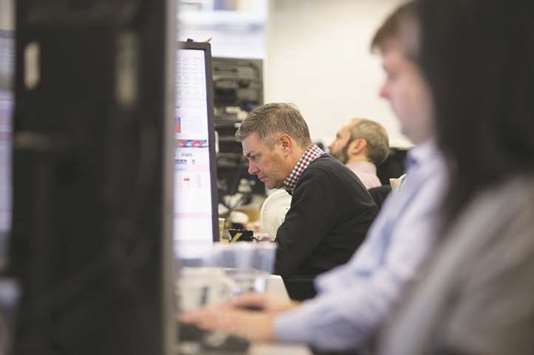The world’s stock markets all but froze yesterday as few investors had the nerve to invest fresh money before a long-awaited interest rate call from the Federal Reserve later in the day.
“The Fed trumps all else, and with hours to go until the next decision, caution reigns supreme,” said IG analyst Chris Beauchamp.
Across Europe, London’s FTSE 100 was down 0.1% at 7,271.95 points at close; Frankfurt’s DAX 30 was up 0.1% at 12,569.17, while Paris’ CAC 40 rose 0.1% at 5,241.66.
The EURO STOXX 50 fell 0.2 % at 3,525.55.
Frankfurt equities were a touch firmer at the close, gaining little traction from a rally for shares in German heavy industry giant ThyssenKrupp, which announced a deal with Indian group Tata to merge their steel operations in Europe.
ThyssenKrupp jumped more than 2% following news of the combination to create Europe’s second-largest steelmaker after ArcelorMittal, whose stock was up nearly 1.5% in Amsterdam.
The main index in London was slightly weaker despite data revealing a surprise surge in British retail sales last month, while Paris stocks edged higher.
Wall Street’s Dow Jones only just held on to positive territory approaching midday in New York, with traders saying the Fed’s announcement on its monetary policy meeting was the only game in town.
“Today’s (Wednesday) Fed meeting provides us with enough to pore over for weeks to come,” predicted IG’s Beauchamp.
While Fed policymakers were not expected to raise rates, according to the market consensus, the post-meeting statement and comments from chair Janet Yellen may give hints on a timetable on winding down the Fed’s crisis-era bond-buying stimulus.
“Details on balance sheet reduction will be of interest, but crucially the committee will extend its rate outlook in 2020, and this could give us a good sense of the end-point for the interest rate in this current tightening cycle,” Beauchamp said.
Wednesday’s announcement would come amid broader moves by global central banks to tighten monetary policy in the face of rebounding world economic growth, dealers said.
“We expect steady Fed policy through to the end of the year,” Rabobank analyst Jane Foley told AFP. “All central banks would like to regain more ammunition in preparation of the next downturn, so in this context there is a universal desire of central banks to have higher interest rates — but not at any cost clearly.”
She added: “When the low levels of bond yields is taken into account, money is still very cheap. This factor, combined with good levels of global growth, is a good environment for stocks.”
But Russ Mould, investment director at stockbrokers AJ Bell, added some nuance to that view.
History, he told AFP, shows that “rising rates eventually cool markets (and economies) just like weight stops trains — it is just a matter of how much.
In the US it has tended to take between 8 and 9 rate rises to stop the US equity market in its tracks”.
Asian equities earlier moved tentatively after President Donald Trump threatened to “totally destroy” North Korea if it threatened the US or its allies.
Foreign exchange markets saw little movement, although the Mexican peso was down after an earthquake killed more than 200 people.

Traders study information on trading screens at ETX Capital in central London. The world’s stock markets all but froze yesterday as few investors had the nerve to invest fresh money before a long-awaited interest rate call from the Federal Reserve later in the day.
